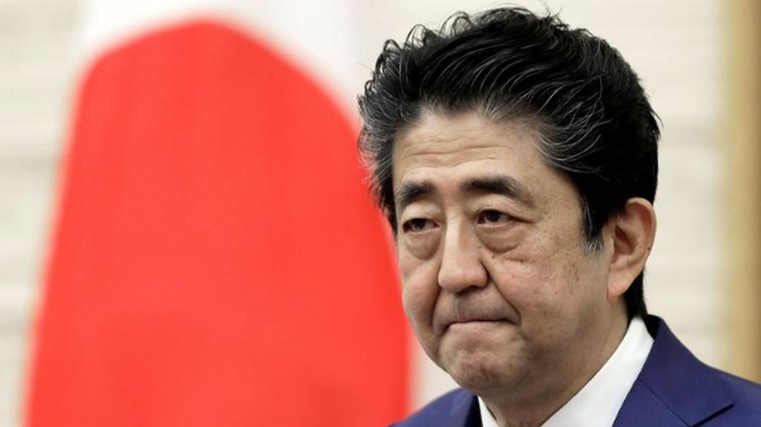Tributes to Japan’s ex-PM

Disbelief and mourning have descended on Japan following the death of Shinzo Abe, the country’s former prime minister.
The 67-year-old was shot while giving a campaign speech on the morning of July 8 (Japan time). He died early that evening.
Abe, the country’s longest-serving prime minister, who resigned in 2020, was flown to hospital by helicopter after the attack outside Yamato Saidaiji railway station in Nara, western Japan.
Police have arrested a 41-year-old man in connection with the shooting and say the weapon was a homemade gun fashioned out of metal and wood.
“I am simply speechless over the news of Abe’s death,” says Prime Minister Fumio Kishida. “This attack is an act of brutality that happened during the elections, the very foundation of our democracy, and is absolutely unforgivable.”
Abe, pictured above, had been making a campaign speech outside the train station when two shots rang out. Security officials were then seen tackling the suspect.
It is understood the suspect bore a grudge against a “specific organisation” and believed Abe was part of it. His grievance was not about politics, say police, who add it’s unclear if the unnamed organisation actually exists.
Abe’s killing was the first of a sitting or former Japanese leader since a 1936 coup attempt when several figures including two ex-premiers were assassinated.
Post-war Japan prides itself on its orderly and open democracy. Senior Japanese politicians are accompanied by armed security agents but often get close to the public, especially during political campaigns.
In 2007, Iccho Itoh, the mayor of Nagasaki, was shot and killed by a yakuza gangster. The head of the Japan Socialist Party was assassinated during a speech in 1960 by a right-wing youth with a samurai short sword. A few other prominent politicians have been attacked but not injured.
Two years since stepping down, Abe has remained a dominant presence over the ruling Liberal Democratic Party (LDP), controlling one of its major factions.
Kishida, who won the premiership with Abe’s backing, says the LDP would continue election campaigning this weekend to demonstrate its resolve to “never give in to violence”, and to defend a “free and fair election at all cost”.
Akio Toyoda, chairman of the Japan Automobile Manufacturers’ Association (JAMA), says: “I am deeply shocked and saddened by the news of the passing of former Prime Minister Shinzo Abe. I am deeply outraged and firmly condemn such a brutal and despicable act, which should never have occurred.
“Mr Abe cared more than anyone about world peace and the future of Japan. The former PM fully devoted himself to the cause and left his mark of excellence in diplomacy and security issues, based on leading the longest stable administration in constitutional history.
“His Abenomics-centred stewardship also led the country to a strong recovery from the global financial crisis and the Great East Japan Earthquake. We, JAMA, would like to express our heartfelt gratitude for Mr Abe’s great achievements during his lifetime. We offer our deepest sympathies.”
Aroha for Japan
Prime Minister Jacinda Ardern describes the fatal shooting of Abe as an “unfathomable” act of violence. She sent New Zealand’s condolences to Japan following the confirmation of his death.
“We stand with Japan in its condemnation of what has happened,” says Ardern. “Mr Abe was one of the first world leaders I met when I became prime minister. He was always focused, thoughtful and generous.
“I remember after our first bilateral meeting as we were waiting for an official photo, he leaned over to tell me he was sorry my cat had passed away.
“In the meetings we had in the years that followed, I saw a statesman, someone who helped usher through complex negotiations like the CPTPP [Comprehensive and Progressive Agreement for Trans-Pacific Partnership], but I also saw someone who was kind.
“Mr Abe’s loss will be deeply felt by so many. Japan is a very close friend of ours, and my recent visit to Tokyo emphasised to me the strength of our relationship, the connections between our people and values we share. We stand together in support of our Japanese friends.
“My thoughts are with Shinzo Abe’s wife and family, and with the government and people of Japan. Our aroha, our love, is with you all.”
Former Prime Minister, Sir John Key, says: “It is with great sadness that I learned of former PM Abe’s death. Over his time as PM, I worked closely with PM Abe on a variety of issues including TPP. I always found him to be engaging thoughtful and a good friend of NZ." Key was prime minister when Abe became PM of Japan in 2012.
Kishida faces an upper-house election on July 10 in which analysts say he hopes to emerge from Abe’s shadow and define his premiership.
Abe has been best known for his signature “Abenomics” policy, which featured bold monetary easing and fiscal spending.
He also bolstered defence spending after years of declines and expanded the military’s ability to project power abroad. In a historic shift in 2014, his government reinterpreted the post-war, pacifist constitution to allow troops to fight overseas for the first time since World War Two.
Abe first took office in 2006 as Japan’s youngest prime minister since World War Two. After a year plagued by political scandals, voter outrage at lost pension records and an election drubbing for his ruling party, Abe quit citing ill health. He became prime minister again in 2012.
Below: Shinzo Abe lies on the ground after being shot on July 8 in Nara, western Japan. Photo: Kyodo via Reuters.






